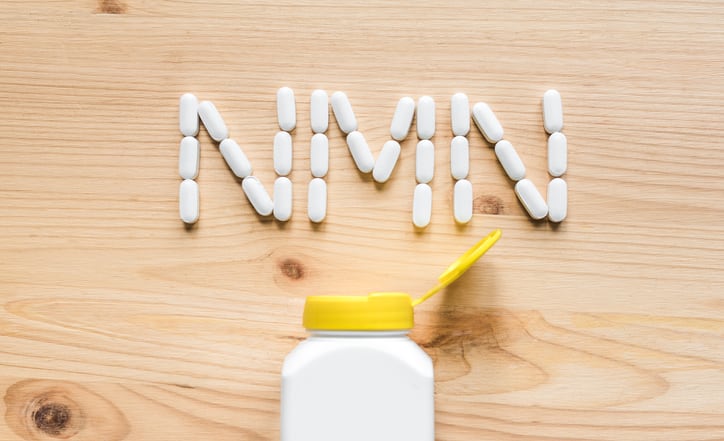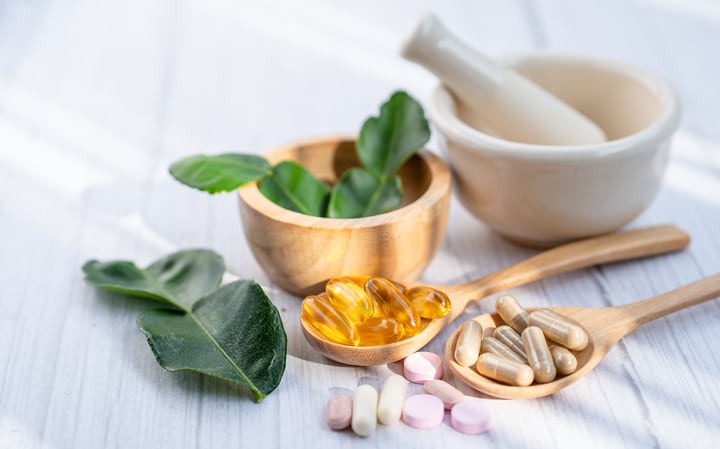Three out of the 18 products tested were found to contain no NMN. These three products were a tablet and two capsule NMN products.
Six of them were detected to contain NMN that were 20 per cent to 100 per cent lower than what was claimed.
Another six of them contained NMN that were between zero to 20 per cent lower than the amount claimed.
The remaining three contained NMN at levels that exceeded the label claim.
Conducted by researchers from the medical school and The Centre of Innovation for Complementary Health Product at Temasek Polytechnic, the test examined the amount and purity of NMN that was available in 18 NMN supplements sold in Singapore. These supplements came in various formats – from capsule, powder, liquid, tablet, to softgel.
Findings of the study were presented by Dr. Elena Sandalova, senior research fellow at the NUS Yong Loo Lin School of Medicine.
Speaking at the “Unlock Healthy Longevity Supplements Conference” organised by the school on March 1, Dr. Sandalova called for the industry to come together in resolving the issue.
Regarded as a geroprotector, NMN was one of the most talked-about NAD+ (nicotinamide adenine dinucleotide) precursors at the conference, with researchers and companies talking about its new scientific findings as well as market trends.
NAD+ is a naturally occurring molecule in human cells and its levels decline with age. Increasing NAD+ levels have been shown to improve physical performance and reduce the risk of cardiovascular diseases, such as hypertension and arterial stiffness.
During the test, the research team from NUS weighted each of the 18 products to find out the actual weight of each dose, calculated the amount of active ingredients inside each dose, and calculated the difference between the actual amount of NMN detected and the amount claimed on the product label.
“Out of 18 products tested, there were three where NMN was completely non detectable,” she said.
The products were tested at least one year before their expiry dates.
“We ensured that the products were tested within the expiry period – more than one year before the expiry period, so that we are sure that this [is the amount] intended to be consumed by the consumers, and we wanted to see what were the amounts that consumers were consuming. That was our objective.”
She gave another example of a product which claimed to contain 500mg of NMN per capsule.
While the NMN detected in each capsule was “quite pure” at 98.2 per cent, the total weight of each capsule content was below 500mg – at 453.1mg – and the amount of NMN present was even lower at 444.8mg. This amounts to a 11 per cent difference from the label claim.
“In this particular product, the problem comes not so much from the purity of the NMN, but actually from the weight of the capsule,” she said.
Nonetheless, purity was also an issue for some other problems.
“In some other products, the purity of NMN might be the problem, for the others, the dose [of NMN detected] is a problem, and it also could it be that some products have put in a higher content [of NMN] due to the higher weight of each dose.
“And so, I would like to conclude that the amount of active ingredient indicated on the label claim actually poorly corresponds to the amount detected,” she said.
Three of the products contained NMN at levels that were higher than the declared amount possibly due to overages, she said.
This is a common practice in the supplement industry as manufacturers do so to ensure that the amounts of actives claimed on the product label would remain throughout the shelf life.
Calls for industry effort
Findings of the test were made known to the product manufacturers and Dr. Sandalova has called for an industry-wide effort in solving the problem.
“We really welcome the manufacturers to work together as a whole industry to solve this problem.
“For the follow-up, we contacted every single manufacturer and informed them about their individual results. Many of them came back and now we have an open dialogue,” she said.
The findings are also expected to be published in a scientific journal, where the discussion and feedback from the manufacturers would be include in the manuscript.
She also highlighted that the NMN supplement space was fast evolving, with new players entering the field and some of the products exiting the market at the same time.
“When I was trying to contact some of the brands, I couldn’t find a contact. This field is evolving so fast. There are new brands that are appearing, some of the brands will continue to evolve and improve their products…” she said.
Testing method not suitable for liposomal products
One limitation of the test was that it was not intended to be tested on liposomal products, and Dr. Sandalova has called for a new testing method to be developed for such products.
The present test assessed three liposomal products, but it was unclear if the sample preparation could fully release the active ingredient from the liposomes, which would in turn affect the amount of NMN that the team was able to detect, she said.
Other aspects, such as stability and presence of toxic compounds, were also not examined in this test, as the purpose was to test the amount and purity of the active ingredient.
“To declare, we’re not a testing lab. And that’s not what we want to continue to do. But we would love to work together with the companies to develop these quality standards,” she said.





